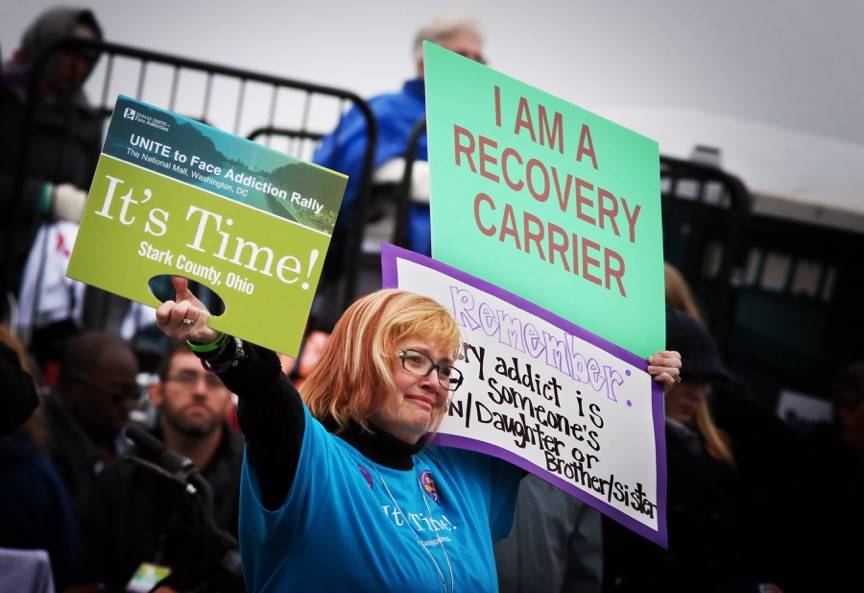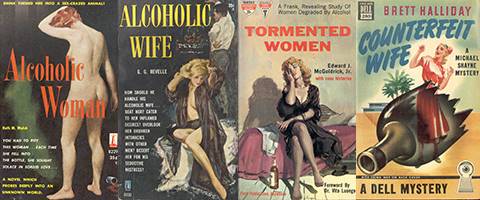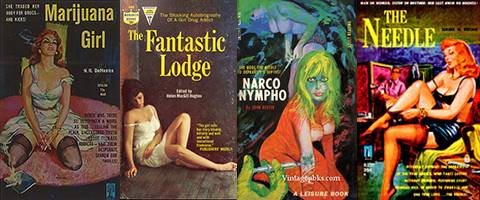
Today, women in addiction recovery are visibly leading and supporting recovery advocacy organizations, and they are speaking at and participating in national and local public recovery celebration events. Such actions rest on the legacy of the first women who challenged the discrediting images linked to addicted women. This brief photo-essay begins with the story of eight women who publically disclosed their recovery from addiction and then explores the stigma-laden cultural contexts in which these disclosures occurred.
Lillian Roth (1910-1980) was an early film star who graced popular films of the late 1920s and 1930s. Following the 1953 public disclosure of her recovery from alcoholism in the TV series This Is Your Life, she received tens of thousands of letters of praise and requests for advice. The following year, she elaborated on her recovery story in her New York Times best-selling autobiography I'll Cry Tomorrow (1954) with an accompanying Hollywood biopic (1955) starring Susan Hayward. This was followed in 1958 by an expanded biography entitled Beyond my Worth. Lillian Roth returned to stage and screen in the 1960s, finishing a most illustrious career.
Mercedes McCambridge (1916-2004) appeared in innumerable films and television shows between 1949 and 1986, winning an Academy Award for Best Supporting Actress in 1949 for her role in All the Kings Men. She publically disclosed her recovery from alcoholism in numerous venues, including in her 1981 autobiography The Quality of Mercy. She used her status as an award-winning actress and her personal recovery story to advocate for the treatment of alcoholism as a medical condition. She offered influential Senate testimony in 1969 in support of legislation that a year later laid the foundation for modern community-based alcoholism treatment.
Marty Mann (1904-1980), one of the first women to achieve prolonged sobriety within Alcoholics Anonymous, founded the National Committee for Education on Alcoholism in 1944--forerunner of today's National Council on Alcoholism and Drug Dependence (NCADD). Her writings and speeches almost single-handedly laid the groundwork for modern alcoholism education and alcoholism treatment. Everywhere she shared her own story--even in the face of harsh criticisms of such disclosure, women came out of the closet to seek help for alcoholism. Her books included Marty Mann's Primer on Alcoholism (1950) and Marty Mann Answers your Questions about Alcohol and Alcoholism (1970). After decades serving as a public policy advocate, she worked as an alcoholism counselor at Silver Hill Hospital in New Canaan, Connecticut.
LeClair Bissell, MD (1928-2008), a pioneer in the modern history of addiction medicine, disclosed professionally and publically her status as a lesbian physician in long-term recovery from alcoholism. Dr. Bissell was quite influential in pioneering assistance programs for physicians and other professionals and advocating for improved access and quality of addiction treatment in the United States. Her books included Alcoholism in the Professions (1984), A Woman Like You: Life Stories of Women Recovering from Alcoholism and Addiction (1985), Ethics for Addiction Professionals (1987), and a children's book entitled The Cat Who Drank Too Much (1982).
Susan B. Anthony II, PhD (1916-1991), grandniece of the famed feminist and civil rights activist, was a women's rights and peace advocate who was quite open about her recovery from alcoholism--a recovery process she attributed to an encounter with Marty Mann. She shared her recovery story in her 1971 autobiography The Ghost in My Life and in numerous speeches. In the 1970s, she became a vocal advocate for expanding services for the treatment of alcoholism and later co-founded Wayside House, a treatment center for addicted women in Delray Beach, Florida.
Jean Kirkpatrick, PhD (1923-2000) founded Women for Sobriety (WFS) in 1975. She was a sociologist by professional training, but founded the WFS "New Life" program based on her own personal recovery from alcoholism. She spoke throughout the country sharing her recovery story and detailing the WFS program in a series of books that included Turnabout: New Help for the Woman Alcoholic (1977) and Goodbye Hangovers, Hello Life (1986). The founding of WFS marked the beginning of modern gender-specific and secular mutual aid alternatives to Alcoholics Anonymous and other 12-Step programs.
Betty Ford (1918-2011) and former President Gerald Ford courageously declared to the American public in the spring of 1978 that Mrs. Ford had been treated for, and was recovering from, dependence on alcohol and prescription drugs. She became the driving force behind creation of the Betty Ford Center in 1982, continued to share her story publicly, and testified numerous times before Congress on the subject of addiction treatment. Her powerful personal testimony inspired the recoveries of innumerable women.
Ann Richards (1933-2006), former Governor of Texas, lived openly as a person in long-term recovery from alcoholism after announcing in 1980 that she was seeking treatment for dependence on alcohol. She presented a quite memorable keynote address at the 1988 Democratic Convention and, a year later, published her autobiography Straight from the Heart: My Life in Politics and Other Places. As Governor, she championed the expansion of alcoholism treatment services in Texas.
The women profiled above are distinctive in garnering national attention. Women of color in recovery also publically shared their stories within their local communities, but would not garner national attention until media coverage of people of color and communities of color increased in the late Twentieth Century. Recovery stories of women of color remain rarely told in the national media, leaving the stigma attached to addicted and recovering women of color deeply entrenched within these communities and the larger culture. A new generation of women of color is challenging such stigmatized images, most notably within African American and Native American communities.
The groundbreaking role that the eight women profiled above played within the history of addiction treatment and recovery in America is difficult to adequately convey, as is the courage required for them to go public with their personal recovery stories. The latter can be understood only by understanding the conflicting historical and cultural forces these and other women of their eras faced regarding their relationship with alcohol and other drugs. Those forces were twofold: 1) the aggressive marketing of alcohol and other drugs to American women, and 2) highly sexualized and stigmatized images of women addicted to alcohol and other drugs. Vestiges of both remain within the contemporary cultural stew.
The alcohol industry, always interested in increasing the consumption of alcohol and thus its profits, has targeted women for a long time. Initially, alcohol was offered to women as a way to find romance and be more attractive to men. More recently, women have been encouraged to use alcohol to assert their independence and to be more overtly sexual. Since there is still a powerful double standard about sex, women are placed in an impossible double bind. They are supposed to be sexy but innocent, experienced but virginal. Alcohol marketers encourage young women to use alcohol to resolve this dilemma and to unleash their sexuality. Of course, they still are blamed if they are sexually assaulted while under the influence (as many are).
At the same time, alcohol marketing often objectifies and insults women. Even more insidiously, it sometimes trivializes sexual assault and even seems to encourage men to use alcohol as a date rape drug. A 2015 ad in a Bloomingdale's catalogue pictured a man eying an unsuspecting young women with the headline, "Spike your best friend's eggnog when they re not looking." And a recent Budweiser campaign labeled the bottle "The perfect beer for removing No from Your Vocabulary for the Night." Such messages normalize dangerous attitudes and contribute to the ongoing false stereotype of the female alcoholic as promiscuous and immoral.
The association of alcohol or drug use by women as an aid to glamour, popularity, and personal tranquility lie in stark contrast to the images of addicted women emerging in this same era. The latter images portray women as immoral, deranged, pitiful creatures. These stigmatized images and characterizations reached their extremes in the newspapers, tabloids, and pulp fiction of the mid-twentieth century and were most evident in conveying women addicted to illicit drugs--a fact contributing to far fewer women publicly disclosing recovery from illicit drug addiction. Little narrative is needed to explicate the themes conveyed by these images. The promotional lines on the book covers say it all:
Drink turned her into a sex-crazed animal!?
Cheap and evil girl sets a hopped-up killer against a city.
How should he handle his alcoholic wife? Beat her? Cater to her inflamed desires? Overlook her drunken intimacies with other men? Desert her for his seductive mistress?
You had to pity this woman. Each time she fell into the bottle, she sought solace in sordid love.
She lusted in sin orgies and reefer brawls.
The intimate story of a girl degraded by drugs.
Women need men. Junkies need dope. I needed both.
She loved men, money and marijuana.
She traded her body for drugs and kicks.
She rode the needle to depravity's depth.
Pitilessly exposes the depravity of the true addict, who takes lovers without number, performs every heinous vice, in order to embrace her one true love the needle!?


Even accounts of women seeking support for recovery from addiction and sharing their stories to help other women perpetuated some of these same themes as they were framed by the popular media of the time.
The eight recovering women profiled in this short essay shattered those images and did so at great personal cost. Today, women with a substance use disorder can seek and maintain their recoveries in a much safer cultural climate because of the courageous acts of these pioneers. There is still much progress needed to address gender-specific dimensions of the social stigma attached to addiction and addiction recovery, but all continued progress will flow from a debt of gratitude to the pioneering recovery advocates profiled above. Their names and their courage should not be forgotten.
Acknowledgement: Special thanks to Robert Gregory for his assistance with preparation of the photos included within this essay. Photos of alcohol ads are courtesy of Jean Kilbourne; all other photos courtesy of Illinois Addiction Studies Archives.
About the Authors: William White, M.A., is Emeritus Senior Research Consultant at Chestnut Health Systems and author of Slaying the Dragon: The History of Addiction Treatment and Recovery in America. Jean Kilbourne, Ed.D., is a noted advocate, speaker, author, and filmmaker. Her books include So Sexy So Soon: The New Sexualized Childhood and What Parents Can Do to Protect Their Kids and Can't Buy My Love: How Advertising Changes the Way We Think and Feel. Her films include Killing Us Softly: Advertising's Image of Women (and the remakes Still Killing Us Softly and Killing Us Softly 3); Deadly Persuasion: The Advertising of Alcohol & Tobacco; Spin the Bottle: Sex, Lies & Alcohol; and Slim Hopes: Advertising & the Obsession with Thinness, Pack of Lies; and Calling the Shots.
Also of Potential Interest:
White, W. (2015). Book Review: Jolene M. Sanders. Women in Narcotics Anonymous: Overcoming Shame and Stigma. Alcoholism Treatment Quarterly, 33(1), 138-140.
White, W. (2015). Gender-specific addiction treatment and recovery support:An Interview with Dr. Stephanie Covington. Counselor, 16(4), 57-61.
White, W. (2009). Tribute to a pioneer: Dr. LeClair Bissell. Counselor, 10(3), 52-56.
Iliff, B, Siatkowski, C., Waite-O?Brien, N., & White, W. (2007) The treatment of addicted women: Modern perspectives from the Betty Ford Center, Caron Treatment Centers and Hazelden. Counselor, 8(3), 42-48
White, W. (2007). An anniversary tribute to a First Lady. Addiction Professional, 5(7), 10-13.
White, W., & Kilbourne, J. (2006). American women and addiction: A cultural double bind. Counselor, 7(3), 46-51.
White, W. (2004). Women who made (and are making) a difference. Counselor, 5(5), 25-29.
White, W. (2002) Women, addiction, and recovery: A historical review. Counselor 3(4):52-54.
White, W., & Chaney, R. (1992). Metaphors of Transformation: Feminine and Masculine. Bloomington, IL: Chestnut Health Systems.
Other women who as public figures disclosed their recovery status include: Drew Barrymore, Mary J. Blige, Naomi Campbell, Susan Cheever, Natalie Cole, Judy Collins, Tara Connor, Jamie Lee Curtis, Kristin Davis, Laurie Dhue, Linda Ellerbee, Carrie Fisher, Sharon Gless, Whoopi Goldberg, Kristen Johnston, Heather King, Lindsay Lohan, Jane Lynch, Mary Tyler Moore, Kate Moss, Stevie Nicks, Mackenzie Phillips, Lucille O?Neal, Kelly Osborne, Bonnie Raitt, Nicole Richie, Susan Rook, Diana Ross, Grace Slick, Jada Pinkett-Smith, Elizabeth Taylor, Elizabeth Vargas.